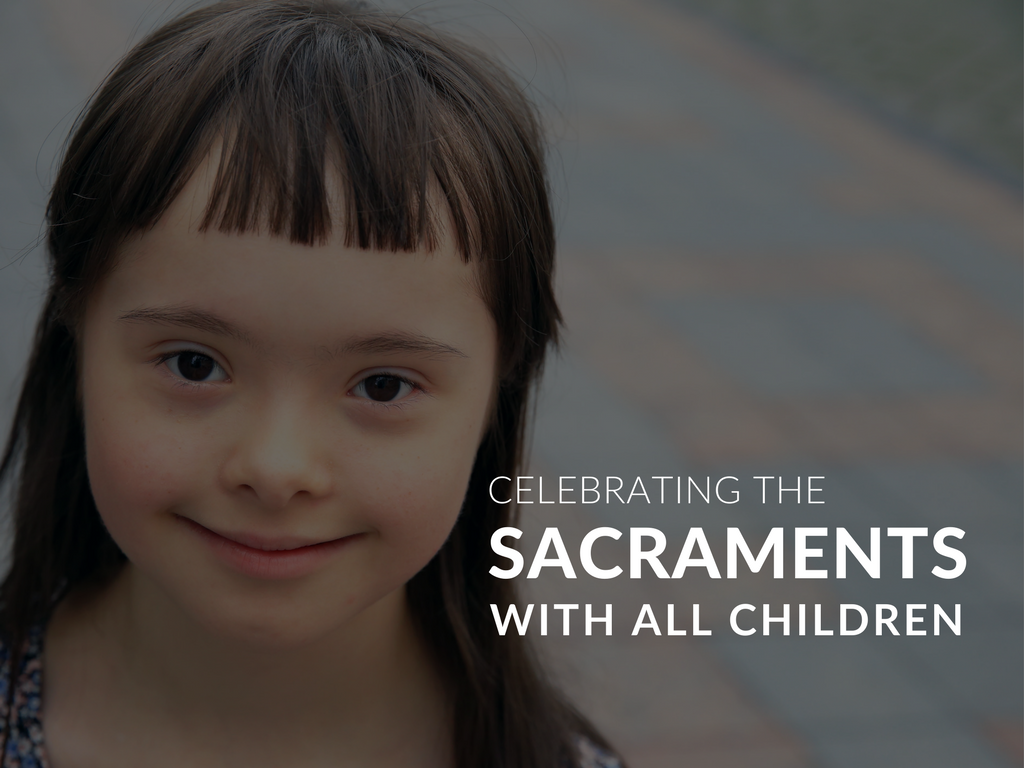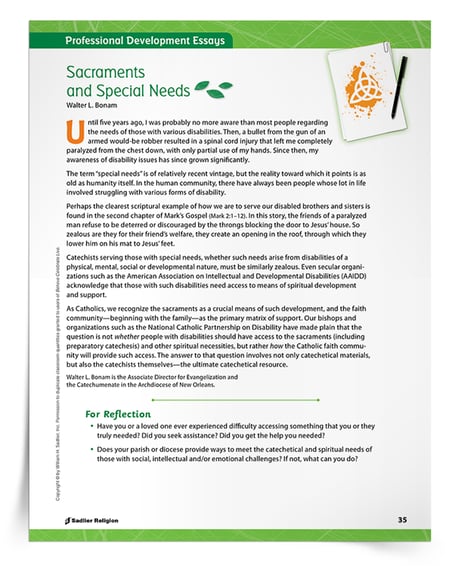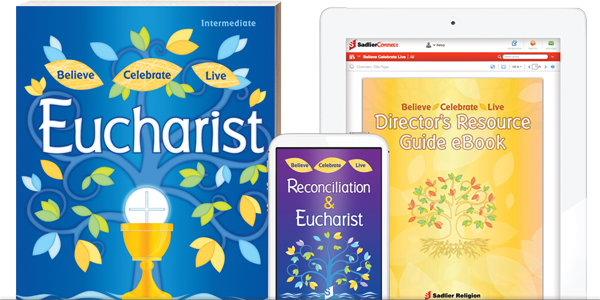March 28, 2018 WBB For Parish, WBB For Catechists, WBB Eucharist, WBB Penance & Reconciliation, REL Seasons - Lent, REL Catechetical - K–6, REL Topic - Catechesis, REL Asset - eBook, REL Sacraments - Pen/Rec, REL Topic- Inclusion, REL Asset - Prayer Card, REL Asset - Support Article, REL PD - Catechist, REL PD - Leaders
During the seasons of Lent and Easter, after many weeks of preparation, it is common to see excited children and young people celebrating two momentous sacramental moments with their families and their parishes: First Penance and First Eucharist. Read on for background on these sacraments and tips for making the preparation process for these sacraments more responsive to the needs of today’s children and families.
Download the Sacraments and Special Needs Professional Development Article now.
Download the Preparing Children for First Penance & First Communion eBook now.
First Penance for Kids
It is common that during the season of Lent, parishes will welcome students to celebrate the Sacrament of Penance and Reconciliation for the first time. Lent is a season of conversion and presents an opportunity to reflect on ways that we can turn to God with all our hearts. During Lent, we are encouraged by the Church to engage in three spiritual practices – prayer, penance, and almsgiving. We are encouraged to celebrate the Sacrament of Penance during Lent. It is fitting therefore that many children will celebrate the sacrament for the first time during the season.
Children celebrating the Sacrament of Penance for the first time have prepared with their families, catechists, and peers and will celebrate the first reception of the sacrament with their parish communities. Their celebration extends beyond the parish: the sacraments join Catholics all over the world with Jesus and with one another, uniting us with the Body of Christ.
What is the Sacrament of Penance? What is first Penance?
The Sacrament of Penance and Reconciliation is a Sacrament of Healing. In this sacrament, the Church celebrates God’s forgiveness. In the Sacrament of Penance, our relationship with God and the Church is strengthened or restored and our sins are forgiven. In the Sacrament of Penance, our sins are forgiven by a priest in the name of Christ and the Church and through the power of the Holy Spirit. We are reconciled with God and with the Church. Our relationships with God and the Church are strengthened, and we are strengthened to live as disciples.
What are the ways to celebrate the Sacrament of Penance?
The Sacrament of Penance can be celebrated in two usual ways: the Rite of Reconciliation of Several Penitents or the Rite for Reconciliation of Individual Penitents. In the first rite, a group gathers to celebrate the sacrament with one or more priests. In the second rite, an individual meets with the priest for the celebration of the sacrament. The sacrament always contains four major parts:
-
Contrition: We express our heartfelt sorrow for our sins and our desire to sin no more by praying an Act of Contrition.
-
Confession: We confess our sins to the priest, naming the ways we have hurt our relationships with God and others and taking responsibility for our actions.
-
Penance: We accept a penance, an action that shows we are sorry for our sins, to make right the harm that we have caused and to show that we are willing to change our lives.
-
Absolution: Our sins are absolved, or forgiven in the name of Jesus Christ and the Church, through the power of the Holy Spirit, bringing reconciliation with God and with the Church.
After the first reception of the Sacrament of Penance, we can participate in the sacrament any time. Participating often helps strengthen our relationships with God and the Church and brings peace and healing into our lives and our world. The Church requires us to celebrate the sacrament at least once a year if we have committed serious sin.
First Penance Prayer Card
This printable Act of Contrition Prayer Card supports those preparing to celebrate the Sacrament of Penance for the first time or any time.

First Eucharist for Kids
After children have celebrated First Penance, they will likely participate in a spring celebration of First Eucharist. The Easter season is a fitting time for the celebration of First Eucharist. The Eucharist is the memorial of Christ’s Passion, Death, Resurrection, and Ascension —the Paschal Mystery.
As in first Penance, children celebrating First Eucharist have prepared with their families, catechists, and peers. They will celebrate the first reception of the sacrament with their parish communities and with the entire Church, joining Catholics all over the world with Jesus and with one another, uniting them with the Body of Christ.
What is the Sacrament of Eucharist? What is first Eucharist?
The Eucharist is the Sacrament of the Body and Blood of Jesus Christ. In the Sacrament of the Eucharist, Jesus is truly present under the appearances of bread and wine. When we participate in the Sacrament of the Eucharist, we are nourished by the Word of God and receive Jesus in Holy Communion. We are joined more closely to Christ and to one another and strengthened to love and serve others as faithful members of the Church.
The celebration of the Eucharist has four parts:
-
The Introductory Rites: We are united as a community and prepared to hear God’s Word and celebrate the Eucharist.
-
The Liturgy of the Word: We listen and respond to God’s Word.
-
The Liturgy of the Eucharist: The gifts of bread and wine become the Body and Blood of Christ, which we receive in Holy Communion.
-
The Concluding Rites: We are blessed and sent forth to be Christ’s servants in the world.
We are called to participate in the Eucharist, also called Mass, every Sunday or Saturday evening. We celebrate this sacrament again and again.
As Catholics, we fully participate in the celebration of the Eucharist when we receive Holy Communion. When we receive the Eucharist we share in God’s own life and we are nourished so we can respond to the gifts of the Holy Spirit. We strengthen our relationships with God and the Church and share God’s love as we live as children of God.
Sacramental Preparation for All Children with Special Needs
As awareness about the unique needs and differences of every child grows, so does the need to provide just-right support to all candidates for these and all sacraments. According to the National Catholic Partnership on Disability, there are more than 14 million Catholics who live with disabilities.
The United States Conference of Catholic Bishops approved a revised and expanded edition of Guidelines for the Celebration of the Sacraments with Persons with Disabilities in June of 2017. The Church welcomes and celebrates the uniqueness of every person. Today’s sacramental preparation must respond with sensitivity and support to differently abled disciples and to their unique learning differences.
Explore an exclusive professional development article, “Sacraments and Special Needs,” which provides a context for adaptive learning support in sacramental preparation, reminding us that the question is not whether people with disabilities should have access to sacramental preparation and sacraments and other spiritual necessities, but how the Catholic faith community can provide this access. The professional development article is available in English and Spanish.
Sacramental Preparation That Takes a Multisensory Approach
Sacramental preparation that takes a multisensory approach supports not only children with learning differences and disabilities, but all types of learners. An approach that includes auditory, visual, and tactile-kinesthetic opportunities boosts engagement and appeals to a wide variety of learning styles. Making adaptations for lessons depending on the unique needs of individual students in your sacramental preparation program ensures access to sacramental preparation and the sacraments for all children.
Sacramental Preparation Program
You’ll find embedded support, tips, and adaptations to help you celebrate inclusion within Sadlier’s transformative sacramental preparation programs, Believe •Celebrate • Live Reconciliation and Eucharist, via the print and digital versions or the innovative program app.
Sacramental Preparation eBook
For additional tips on inspiring, preparing, calming, and celebrating with First Penance and First Communion candidates, explore the 5 Tips for Preparing Students for First Penance and First Communion eBook.












